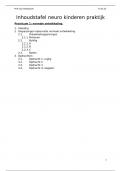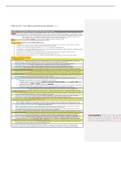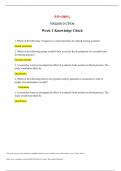Criminology – Theories
MICRO (individual) MESO (neighbourhood, MACRO (society, structure)
process)
Rational Choice Theory Routine Activity Theory Anomie/strain theories
Biological Life-course Theories Critical Criminology (focus on
Social psychology (emotion) Differential association class in society that impact
Theory crime)
Social bond/control theory Left Realism (focus on
Subculture Theories different aspects in society that
Labelling Theory impact crime)
Feminist Criminology (focus
on gender in society that
impact crime)
Social Disorganization Theory
Be able to (critically) assess criminological theories on their (1) level of analysis, (2) view of
crime/criminal, (3) pro’s and con’s, (4) implications for policy/criminal justice.
CHOICE: Classical School of Criminology, Classism (1970--) (Homo Economicus)
KNOWLEDGE THROUGH REASON
1. Rational Choice Theory (RCT)
(Beccaria, Bentham)
= people think rationally before committing a crime, weighing out the means and benefits
making sure the benefits outweigh the consequences.
- Deterrence by punishment.
- Crime is mundane, normal aspect of life.
- Prevention by limiting opportunities (environmental criminology).
o Place design.
o Victims/targets protection/securing.
2. Routine Activity Theory (RAT)
(Cohen & Felson)
= crimes happening in the routine of someone’s daily live when these 3 come together:
1. Motivated offender.
2. Suitable target.
3. Absence of guardian.
no focus on the offender, ‘everyone can become a motivated offender in such a situation.’
3. Situational Crime Prevention (SCP)
= crimes are committed in certain situations/locations which can be changed through focusing
on its design.
Opportunity-reduction by:
, - Measures directed toward highly specific forms of crime.
- Design and manipulation of immediate environment.
- Make crime more difficult and riskier.
playing on territoriality: sense of ownership over immediate neighborhood.
BIOLOGY
KNOWLEDGE THROUGH MEASUREMENT
4. Positivist theory, 19th century
(Lombroso)
= criminals and criminal behavior has its own characteristics and are different from non-
criminals.
Determinism: criminals can be determined through their characteristics (Lombroso: through
the shape of their skulls and faces).
you are or you are not born criminal.
5. Bio-social criminology, neurocriminology 1990s --
= together with social and environmental factors, biological factors also influence in someone
becoming or being a criminal.
THRILLS: Cultural Criminology (Homo Sociologicus)
6. Social Psychology (emotion)
(Katz, Lyng)
= crime is not much calculated or premeditated but done because of emotional appeal, the
thrill of getting caught.
- Crime prevention requires social change.
- Crime is not mundane but extraordinary.
- Crime is a response to insecurities and harms of late-modern society.
LIFE-COURSE THEORIES
Start with The Gluecks and their longitudinal research on boys comparing risk-factors (first of
risk-factor criminology).
7. Self-Control & The General Theory of Crime, 1990
(Gottfredson & Hirschi)
= Individuals are more likely to engage in crime if they have low levels of self-control, which
starts early in life and remains stable over life-course (= continuity).
Self-control = concern for the long-term consequences of one’s act.
major cause: ineffective child-rearing.
MICRO (individual) MESO (neighbourhood, MACRO (society, structure)
process)
Rational Choice Theory Routine Activity Theory Anomie/strain theories
Biological Life-course Theories Critical Criminology (focus on
Social psychology (emotion) Differential association class in society that impact
Theory crime)
Social bond/control theory Left Realism (focus on
Subculture Theories different aspects in society that
Labelling Theory impact crime)
Feminist Criminology (focus
on gender in society that
impact crime)
Social Disorganization Theory
Be able to (critically) assess criminological theories on their (1) level of analysis, (2) view of
crime/criminal, (3) pro’s and con’s, (4) implications for policy/criminal justice.
CHOICE: Classical School of Criminology, Classism (1970--) (Homo Economicus)
KNOWLEDGE THROUGH REASON
1. Rational Choice Theory (RCT)
(Beccaria, Bentham)
= people think rationally before committing a crime, weighing out the means and benefits
making sure the benefits outweigh the consequences.
- Deterrence by punishment.
- Crime is mundane, normal aspect of life.
- Prevention by limiting opportunities (environmental criminology).
o Place design.
o Victims/targets protection/securing.
2. Routine Activity Theory (RAT)
(Cohen & Felson)
= crimes happening in the routine of someone’s daily live when these 3 come together:
1. Motivated offender.
2. Suitable target.
3. Absence of guardian.
no focus on the offender, ‘everyone can become a motivated offender in such a situation.’
3. Situational Crime Prevention (SCP)
= crimes are committed in certain situations/locations which can be changed through focusing
on its design.
Opportunity-reduction by:
, - Measures directed toward highly specific forms of crime.
- Design and manipulation of immediate environment.
- Make crime more difficult and riskier.
playing on territoriality: sense of ownership over immediate neighborhood.
BIOLOGY
KNOWLEDGE THROUGH MEASUREMENT
4. Positivist theory, 19th century
(Lombroso)
= criminals and criminal behavior has its own characteristics and are different from non-
criminals.
Determinism: criminals can be determined through their characteristics (Lombroso: through
the shape of their skulls and faces).
you are or you are not born criminal.
5. Bio-social criminology, neurocriminology 1990s --
= together with social and environmental factors, biological factors also influence in someone
becoming or being a criminal.
THRILLS: Cultural Criminology (Homo Sociologicus)
6. Social Psychology (emotion)
(Katz, Lyng)
= crime is not much calculated or premeditated but done because of emotional appeal, the
thrill of getting caught.
- Crime prevention requires social change.
- Crime is not mundane but extraordinary.
- Crime is a response to insecurities and harms of late-modern society.
LIFE-COURSE THEORIES
Start with The Gluecks and their longitudinal research on boys comparing risk-factors (first of
risk-factor criminology).
7. Self-Control & The General Theory of Crime, 1990
(Gottfredson & Hirschi)
= Individuals are more likely to engage in crime if they have low levels of self-control, which
starts early in life and remains stable over life-course (= continuity).
Self-control = concern for the long-term consequences of one’s act.
major cause: ineffective child-rearing.







